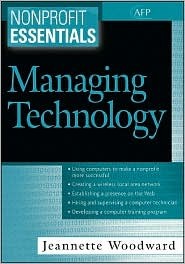
Wind River
Library and Nonprofit Consulting
Library and Nonprofit Consulting
Nonprofits
| Nonprofit Essentials: Managing Technology |
Available from Libraries Unlimited Amazon.com |
Computerization represents an economic
commitment that many nonprofit groups with
tight budgets have been reluctant to make.
However, computerization is no longer
optional. Nonprofits must compete effectively
for scarce dollars. Nonprofit Essentials:
Managing Technology helps nonprofits take
the leap and integrate technology throughout
their operations. With its accessible, easy-to-
read style and in-depth advice, it will get
readers excited about technology instead of
intimidated by it.
Table of Contents
Preface.
Chapter 1. Getting Started with Technology.
Chapter 2. Technology Planning for the Small
Organization.
Chapter 3. Technology Planning for Mid-Size
and Larger Organizations.
Chapter 4. Computer Applications for
Nonprofit Organizations.
Chapter 5. Obtaining Technical Support.
Chapter 6. Hiring Technical Staff.
Chapter 7. Training Volunteers and Staff.
Chapter 8. Supervising Technical Volunteers
and Staff.
Chapter 9. Safeguarding Essential Information.
Index.
Nonprofit Essentials: Managing Technology is
a comprehensive work. Suitable for any size
organization, the book is distinguished by its
focus on 'the human factor' along with
volumes of technology information. It should
prove to be an invaluable resource for
administrators, volunteers, and trustees who
must ensure their organization's effective use
of technology."
--Richard F. Hobson, President Hobson
Renaissance Solutions LLC
commitment that many nonprofit groups with
tight budgets have been reluctant to make.
However, computerization is no longer
optional. Nonprofits must compete effectively
for scarce dollars. Nonprofit Essentials:
Managing Technology helps nonprofits take
the leap and integrate technology throughout
their operations. With its accessible, easy-to-
read style and in-depth advice, it will get
readers excited about technology instead of
intimidated by it.
- Uses real-world examples, exhibits, and
tips and techniques alongside the text
to help the reader comprehend the
subject matter all at once.
- Includes such valuable resources as
sample interview questions, application
forms, evaluation forms, job
descriptions, and a checklist of
technical qualifications.
Table of Contents
Preface.
Chapter 1. Getting Started with Technology.
Chapter 2. Technology Planning for the Small
Organization.
Chapter 3. Technology Planning for Mid-Size
and Larger Organizations.
Chapter 4. Computer Applications for
Nonprofit Organizations.
Chapter 5. Obtaining Technical Support.
Chapter 6. Hiring Technical Staff.
Chapter 7. Training Volunteers and Staff.
Chapter 8. Supervising Technical Volunteers
and Staff.
Chapter 9. Safeguarding Essential Information.
Index.
Nonprofit Essentials: Managing Technology is
a comprehensive work. Suitable for any size
organization, the book is distinguished by its
focus on 'the human factor' along with
volumes of technology information. It should
prove to be an invaluable resource for
administrators, volunteers, and trustees who
must ensure their organization's effective use
of technology."
--Richard F. Hobson, President Hobson
Renaissance Solutions LLC
| Reviews For nonprofit organizations acquiring new technologies is a particular challenge. Hardware is expensive and quickly out of date; software is the same and mostly directed at profit-driven enterprises; and training and support can be beyond the means of a nonprofit organization. Woodward offers practical advice based on her experience with planning and implementing several technologies, including PC systems, wireless local area networks and Web sites. She is careful to keep the needs of both small and larger organizations in mind, including ensuring the technology supports the explicit goals of the organization, working up a technology plan accordingly, figuring out what specific hardware and software to acquire and how to support it, getting current employees and volunteers trained, hiring or contracting with support people, supervising technical volunteers and staff, and safeguarding essential information. The result is an accessible, common-sense guide for people just starting the process. - Reference & Research Book News "Technology in nonprofits is most useful when it frees both human hands and human imagination," writes Jeannette Woodward, library director of the Fremont County Library System, in Lander, Wyo. This book outlines the steps necessary to improve technology at small, mid-sized, and big organizations and how to make the best use of computer applications and of staff members who specialize in technology. Ms. Woodward guides charity managers through the basic steps in designing a technology plan. With chapters on how to select a Webmaster to design and maintain a Web site and when to hire a consultant or other outside contractor for technical help, the author helps nonprofit groups determine whether they need outside technical support or if they can take on large technological projects on their own. One section pertains to the proper training of volunteers and staff members to ensure that they fully understand and can use the computer programs on which the organization relies. Ms. Woodward emphasizes how important it is that people who specialize in technology and those who do not speak the same nomenclature be flexible regarding the other group's needs. She recommends starting a technology- mentoring program for new employees or volunteers to help avoid communication problems. "Without a close association with at least one other staff member or experienced volunteer, new arrivals are likely to remain outsiders, lacking the knowledge base and personal involvement to make informed decisions," she warns. - Chronicle of Philanthropy |

